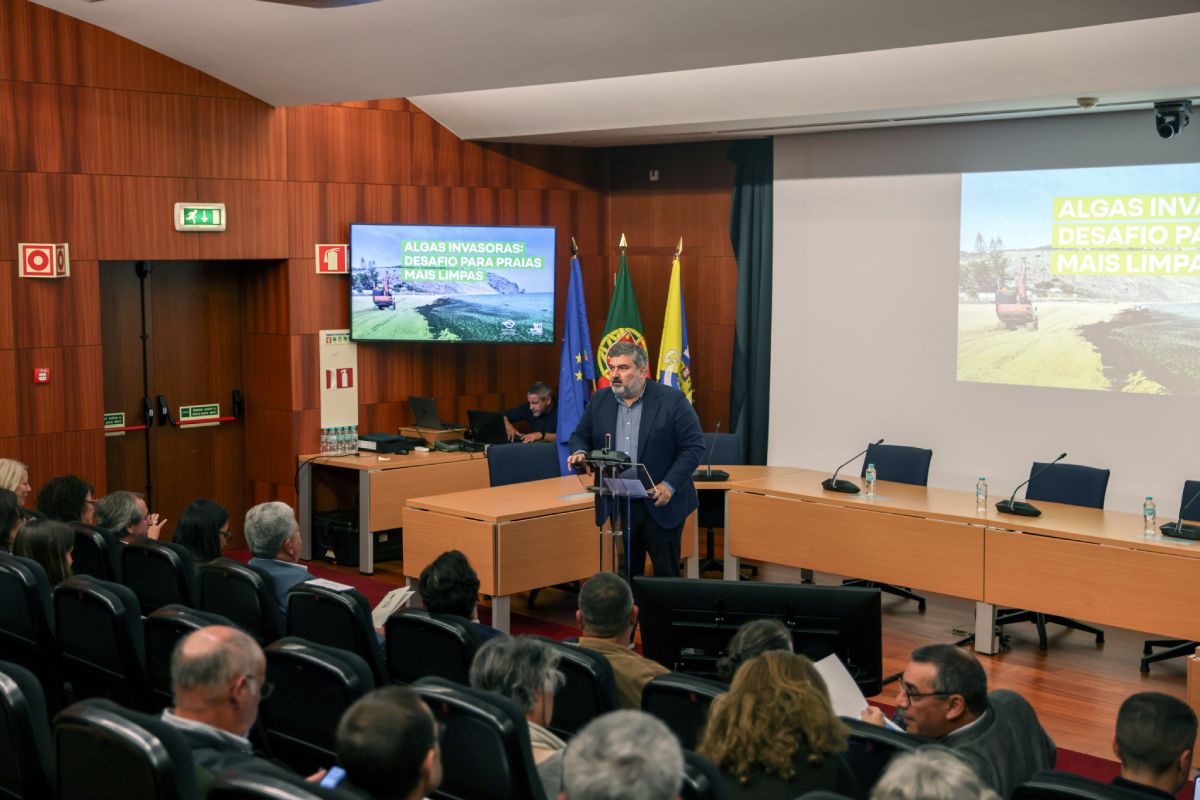The conference organized by the Associação Limpeza Urbana (ALU) with the support of the Lacobrigense municipality brought together mayors, regional and national entities and the general public in the Century City Hall Auditorium to debate this problem that, in recent years, has affected the Portuguese coast.
Addressing different perspectives, the message was clear: more cooperation between municipalities, greater involvement of the scientific community, economic valorization of the collected algae and the need to create a central government support fund for the affected municipalities.
Detected for the first time in mainland Portugal at Praia Dona Ana in 2021, the species Rugulopterix okamurae originates from the Asian coast, more precisely from Japan and South Korea, and has led to issues and expenses for Portuguese municipalities (with a special focus on western Algarve) and Spanish, the most recent case being its presence in large quantities in Meia Praia.
Its growth occurs on rocks and generally appears with higher water temperatures and rough tides that cause them to break loose and accumulate on beaches. The situation has worsened year after year, affecting the environment, tourism, local economy and the well-being of the population, in addition to the costs for city halls to remove this invasive species.

The opening session was led by Hugo Pereira, president of Lagos City Council, and Luís Almeida Capão, president of the ALU board, followed by interventions by Rui Santos (Center for Marine Sciences at the University of Algarve) and Conceição Gago ( representing the Portuguese Environment Agency – Algarve), who presented a more scientific perspective on this macroalgae. Outlining a profile of its benefits, dangers and behaviours, Rui Santos said that, through investment, the scientific community can cooperate through research, mapping and prediction, allowing intervention well in advance. In addition, greater economic valorisation of this resource is also essential through biorefineries that enable reuse (feed, fertilizers, fibers for the textile industry, for example). Conceição Gago, on the other hand, guaranteed that the presence of this exotic species with a great capacity for dispersion and colonization does not affect the quality of bathing water, and that regulation (ICNF and DGRM) is still necessary regarding solutions to solve the problem.
Franciso Cerdan, tourism and beaches delegate for the Costa del Sol Occidental (Spain), a region also affected, shared his experience, which includes intermunicipal cooperation, as well as the need to look at seaweed as a residue with different characteristics than domestic.

Innovative solutions
From a more practical perspective, companies associated with ALU were presented with innovative solutions that allow for the lowest possible environmental impact when removing tons of algae from the sands (Almovi and Certoma). The startup company Easy Harvest announced that it is already intervening in Lagos by removing algae through vacuuming at sea (20 to 30 tons in six hours), anticipating its arrival and accumulation on the beaches. The experience also includes the collaboration of local fishermen.
Luís Bandarra, councilor responsible for the Environment, revealed that, in the space of four years, the Lacobrigense municipality has already spent around 348 thousand euros to remove macroalgae from the municipality's beaches (especially Batata, Dona Ana, Luz and Meia Praia), unexpected costs that require constant budget revisions and a worrying economic impact in terms of tourism. In the words of the councilor, there is an urgent need for greater commitment and cooperation between Algarve municipalities, greater involvement of the scientific community to find solutions and a fund from the Portuguese government to compensate for these unexpected expenses. In a more positive point of view, he reported that all six thousand tons already collected were delivered to farmers in the Vale da Lama and Sargaçal areas, allowing for greater development of local production.
The work session ended with a round table moderated by David Carvalho (journalist at Jornal do Algarve), where Luís Bandarra, Mário Guerreiro (councilman of Lagoa City Council) and Demétrio Henriques (Operational Director of Cascais Ambiente) participated, debating the way in which each municipality is facing the frequency and impact of this “invasion”, as well as proposals for short, medium and long-term solutions, always keeping in mind the premise that it is possible to turn this problem into an opportunity.














